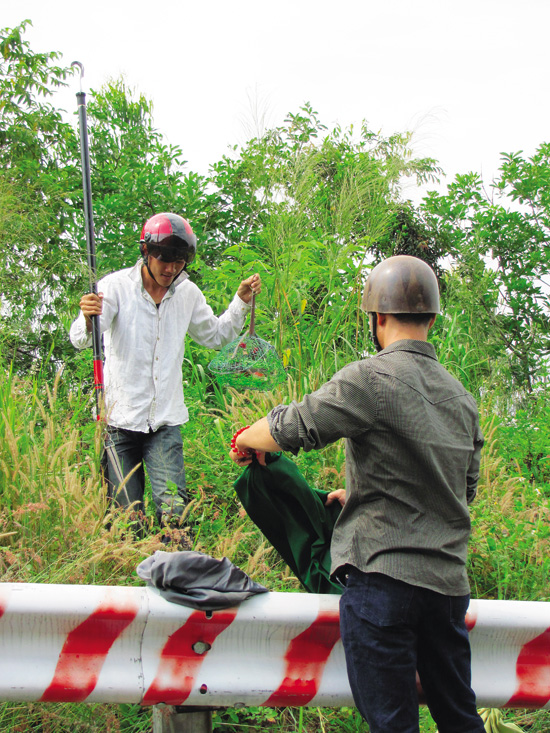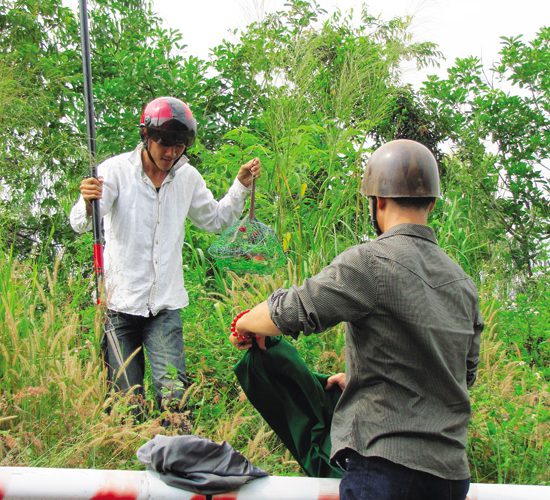Vietnam Heritage, July-August 2011 — Early one Sunday morning in April, after a strong, sweet Vietnamese coffee and a bowl of spicy street noodles, four of us set off on two motorbikes for Son Tra Nature Reserve, a mountainous peninsula, not far from my home in Danang. I was with my young housemate, Tuyet, and my friend, Trang, an Education for Nature – Vietnam (ENV) officer, and her friend, Tho, who knew the mountain well.

On our way up the mountain, we passed two guys sitting at the roadside. I knew what they were up to – they were bird-catchers. My birdwatcher friend, Minh, Education Officer at Bach Ma National Park, told me last year that he’d seen about ten bird-catchers in two hours, when he last visited the Nature Reserve. Another friend had seen many up there, but when he confronted them, he’d been driven off with stones.
Even as we passed, one walked across the road with a caged bird and a pole, heading for the trees opposite. They use a captive bird as decoy in a small, conical bamboo cage, camouflaged with leaves. It is hung high in a tree and left to sing, to entice a wild bird into the cage. I could hear shrill birdsong from inside the foliage. As we zoomed past I yelled, ‘??ng làm v?y!’ (Don’t do it!), knowing already the futility of my words. Catching up with our two friends and riding alongside them, I called to Trang on the back.
‘Did you see those bird-catchers?’
‘Yes’
We continued the conversation riding in
parallel, Vietnamese style.
‘Can’t we do anything about it? Can’t you
talk to them?’
‘Do you think it’d do any good?’
‘I don’t know, but we can try.’
So we turned back and pulled over next to where the one guy was sitting at the roadside. His mate was across by the trees, hanging another cage. They were casually dressed and looked about thirty. Trang had already observed that they didn’t look poor. She sat down next to the one sitting, addressed him as Anh (Older Brother) and proceeded to talk to him in a sweet, gentle manner.
Her modus operandi differed from mine, which was often full of bluster, anger and righteousness and rarely had the desired effect. I sat next to her and surreptitiously turned on my recorder. A conversation ensued, with the man elaborating at length. This is also the Vietnamese way. Indirectness is inherent in the culture and the language itself uses many more words than English.
Eventually, Trang turned to me and began translating what he had said:
‘This is the third day that they come here, but they not get any bird, but they want to get it to breed with their bird. So they bring it to the forest so it can sing with others.
‘I said, “Don’t you think it’s better when they’re free?” and he said [it depends on the] species. This is his favourite, Red-Whiskered Bulbul, and there is many, many people like him. And he says that this is a species that reproduce fast, especially in April. I said that you are a foreigner and that you cannot accept this situation in Vietnam.’
‘And he says he’s just like a visitor; he’s come here once a month, and he says he’s not like other local people who come here every day and catch the birds to sell to the rich person. And currently, it’s difficult to catch the birds; the first thing is that there’s not many birds and the second is they are afraid of people and they avoid people. Even though the rich person pays the higher price for the bird, they cannot catch. And when I ask them how can I persuade them to stop it, he said, “You cannot, because this is the favourite of Asian”, and there are many, many people like him; … he’s just a very small person and this is just a small hobby. And I said, “Maybe in the future there is not any birds any more. Would you like that?” Unconvinced, he repeated, “They reproduce very fast’”
An estimated 30 birds a day are caught on the mountain to be sold to local bird shops. No species can sustain this pillaging of its population.
Songbirds are almost all captured from the wild and it seems to be exclusively men that have this hobby. Tiny cages containing solitary birds can be seen hanging high above shop awnings on most city streets, where they are subjected to incessant honking, traffic noise and pollution. In a Buon Ma Thuot restaurant there was a caged bird on top of a blaring TV. Songbirds are also particularly popular in garden cafes, where they must endure excessively loud music and clouds of cigarette smoke. To such a café in Tam Ky, next to the hotel I stayed in while teaching, a bird-catcher brought wild birds to ‘get them used to people’ before he could sell them. I had tried talking to the café-owner (a Buddhist) about it, to no avail. The birds would flap from wall to wall of the cage, in extreme distress. Unable to stand it, one day I slyly opened the cage of one such newbie and watched anxiously, till it escaped, before the café-owners realized what was happening. Then I asked how much and handed over VND60,000. From that day on I boycotted the café.
I saw my neighbour across the street in Danang setting out several cages of his captives on the kerb, right next to roaring traffic, and then proceed to blast each of them with water he spat from his mouth. The birds flapped to the opposite wall of the cage in panic. I ran across the street to stop him and he looked at me uncomprehendingly. My friend rushed over to assist and translated, ‘He wants to give them a sun bath.’ Last month I watched with horror as some guys began demolishing the bird-shop next door, and just placed the cages full of birds on the ground in full earshot in the full midday sun.
The seeming lack of awareness of the sensitivity of birds does not surprise me, in a harsh urban environment that becomes louder by the day, when the Vietnamese themselves seem immune to it.
Trang continued, ‘He also said that rangers might come here and take the cage; but the ranger says he will give back the cage, if he give him money. So the ranger gets the money, and let him keep the cage. That is the way ranger do. So they don’t afraid of ranger – if they have money.’
I asked, ‘How much money?’
‘For a bird in a cage, that is well-trained, that sings a lot to welcome others, about 1.5 million. But only about 200,000 for a wild bird (newly caught) . . . because wild bird is afraid, so when you bring it home, it cannot sing.’
‘So the ranger will get 1.5 million?’
‘Yes, and give back the cage.’
‘And if they don’t have money, the ranger will take the cage?’
‘Mm. Maybe they will sell to another . . . Yes, because you know, maybe the rangers have their hobby too.’
Minh, the birdwatcher, said bulbuls had used to cost only 5,000 dong (25c) each, and now they were 50,000 dongs ($2.50). Another friend was in a bird shop and witnessed a guy being paid VND800,000 for six wild yellow songbirds. As the birds become rarer, the price increases, as in all the wildlife trade.
Meanwhile we could hear the bird singing its heart out in the tree.
‘I also said, how can I persuade you, and people like you to stop it, to have better environment, like abroad. He said, “You couldn’t. This is Asia. This is the Asian culture.” And I just recommend that he shouldn’t catch the Shama Thrush, a bird with a red breast and a long white tail. It’s protected by law, cause they are endangered. He said they just catch the species that are stable.
‘I also asked him about nets – to catch a group of birds – and he said, no, not in this area, because there is not enough birds and even the ranger do not permit them to catch by net.’
The other guy came back from the trees, carrying a long black pole with red bands, like a pogo stick, with a hooked blade on the top, for cutting branches and hanging the cage in the tree.
I asked, ‘They made that specially?’
‘No, they bought it – it cost 2 million ($100). I said, “You spend so much money on that?” He said, “Yes, for our hobby, we can spend a lot.”
Suddenly a motorbike rolled up the hill carrying two men in beige uniforms.
I asked, ‘Are these rangers?’
‘Yes.’
‘Ooh, let’s see what happens.’
One got off and walked across to the bird-catchers, said a few words politely and got back on the bike. The guys jumped up, saying ‘C?m ?n’ (Thank you).
‘This is what he said: “Please go back to your home, because today, there are many leader of the department come here to check, so please come home.” … He also said that there are many foreigners come here and maybe they can take the photo and have problem for them.’
I said, ‘That’s great police work they do.’
Trang said, ‘That is give advice.’
The guys retrieved three cages from the trees, which they quickly covered with green cloth bags to transport, while I got a few photos.
On that day it became clear why the bird shops, like the two in my street, are teeming with wild birds.
Recently, I had the delightful company of one such escapee – a black-throated laughingthrush (a ‘protected’ species) that had crash-landed in our house. It had an injured leg, so regrettably I also had to keep it captive, while its leg healed. Sharing my space with that small, very different being taught me slowness, gentleness and quietude (such a contrast to the urban milieu that hundreds of wild birds suffer). In those two or three weeks, I began to learn its language and develop a tentative relationship. But it was still my prisoner. Once its leg was sound, I gave it the choice of freedom. It considered for a few moments, then took off straight to the nearest tree.
Whenever I ask people why they keep birds in cages, they invariably smile and say, ‘Because their song relaxes me.’ There is no concern for the feelings of the bird. The fact is many of these birds die within a couple of weeks. The stress kills them.
,,
,,

